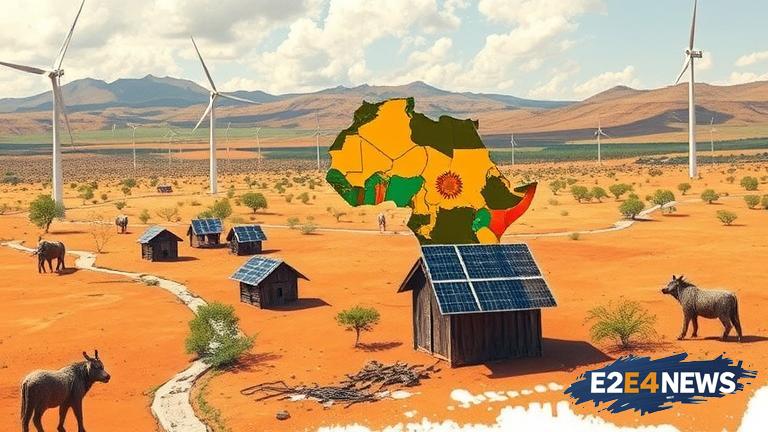The African continent is witnessing a significant shift towards renewable energy, driven by the need to address the pressing issues of energy access, climate change, and sustainable development. With many countries still struggling to provide reliable and affordable electricity to their citizens, renewable energy has emerged as a viable solution. Solar and wind power are leading the charge, with countries like South Africa, Egypt, and Morocco investing heavily in these sectors. The African Union’s ambitious goal of achieving 100% access to electricity by 2030 has further accelerated the adoption of renewable energy. Governments and private sector companies are working together to develop large-scale renewable energy projects, creating new opportunities for economic growth and job creation. The use of renewable energy is also expected to reduce greenhouse gas emissions, contributing to a cleaner and healthier environment. Moreover, the cost of renewable energy is decreasing, making it more competitive with fossil fuels. This trend is likely to continue, driving further investment and innovation in the sector. As the demand for energy continues to rise, African countries are exploring new technologies and business models to increase access to renewable energy. Off-grid solar systems, for example, are providing energy to remote communities, while mini-grids are being developed to serve larger populations. The growth of renewable energy is also creating new opportunities for women and youth, who are increasingly involved in the development and implementation of renewable energy projects. Furthermore, the African renewable energy market is attracting international investors, who are drawn to the continent’s vast natural resources and growing demand for energy. However, despite the progress made, significant challenges remain, including the need for greater investment in energy infrastructure and the development of more effective policies and regulations. To address these challenges, governments, private sector companies, and civil society organizations must work together to create an enabling environment for the growth of renewable energy. This includes investing in research and development, building capacity, and promoting awareness and education about the benefits of renewable energy. Additionally, there is a need for greater coordination and cooperation among African countries to share knowledge, expertise, and best practices in the development and implementation of renewable energy projects. The African renewable energy revolution has the potential to transform the continent’s energy landscape, driving economic growth, reducing poverty, and promoting sustainable development. As the world transitions to a low-carbon economy, Africa is well-positioned to play a leading role in the development and deployment of renewable energy technologies. With its vast natural resources, growing demand for energy, and increasing investment in the sector, the future of renewable energy in Africa looks bright. The continent’s renewable energy revolution is not only a necessity but also an opportunity for African countries to leapfrog traditional energy systems and adopt cleaner, more sustainable, and more efficient technologies. In conclusion, the growth of renewable energy in Africa is a positive trend that has the potential to drive economic growth, reduce poverty, and promote sustainable development. As the continent continues to transition to a low-carbon economy, it is essential that governments, private sector companies, and civil society organizations work together to create an enabling environment for the growth of renewable energy.
